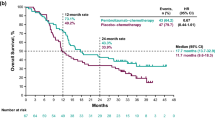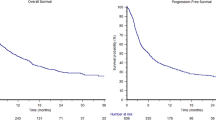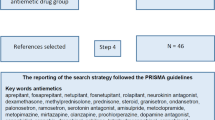Abstract
Purpose
We conducted a retrospective cohort study to examine whether neutropenia could be an indicator of good prognosis in patients treated with gemcitabine (GEM) for unresectable pancreatic cancer.
Methods
A total of 178 patients with unresectable pancreatic cancer, who were treated with first-line (n = 121) or second-line (n = 57) GEM, were included in our analyses. A Cox proportional hazard model was used to examine the effect of the grade of GEM-induced neutropenia on prognosis. Furthermore, the difference in survival time for each grade was assessed using a log-rank test.
Results
In the first-line population, the hazard ratios of patients with grade 2 or grade 3 neutropenia compared with the ratios of those without neutropenia (grade 0) were 0.43 (95% CI 0.27–0.70) and 0.37 (0.21–0.65), respectively (p < 0.05). The median survival time (MST) was 3.8 months for grade 0, 9.4 months for grade 2, and 10.1 for grade 3. Landmark analysis of the second-line population revealed a hazard ratio of 0.52 (0.30–0.82) for grade 1 and 0.49 for grade 2 (0.28–0.72) (p < 0.05). MST was 1.3 months for grade 0, 4.7 months for grade 1, and 4.6 months for grade 2.
Conclusions
We found that neutropenia grade was an indicator of good prognosis in patients treated with first-line and second-line GEM for unresectable pancreatic cancer. A prospective study should be performed to examine whether dosage adjustment using neutropenia grade as an indicator would improve prognosis.



Similar content being viewed by others
References
Jemal A, Bray F, Center MM et al (2011) Global cancer statistics. CA Cancer J Clin 61:69–90
Ahlgren JD (1996) Chemotherapy for pancreatic carcinoma. Cancer 78:654–663
Bramhall SR, Rosemurgy A, Brown PD et al (2001) Marimastat as first-line therapy for patients with unresectable pancreatic cancer: a randomized trial. J Clin Oncol 19:3447–3455
Heinemann V, Quietzsch D, Gieseler F et al (2006) A phase III trial comparing gemcitabine plus cisplatine compared with gemcitabine alone in advanced pancreatic adenocarcinoma. J Clin Oncol 24:3946–3952
Van Cutsem E, van de Velde H, Karasek P et al (2004) Phase III trial of gemcitabine plus tipifarnib compared with gemcitabine plus placebo in advanced pancreatic cancer. J Clin Oncol 22:1430–1438
Oettle H, Richards D, Ramanathan RK et al (2005) A phase III trial of pemetrexed plus gemcitabine versus gemcitabine in patients with unresectable or metastatic pancreatic cancer. Ann Oncol 10:1639–1645
Louvet C, Labianca R, Hammel G et al (2005) Gemcitabine in combination with oxaliplatin compared with gemcitabine alone in locally advanced or metastatic pancreatic cancer: results of a GERCOR and GISCAD phase III trial. J Cin Oncol 23:3509–3516
Reni M, Cordio S, Milandri C et al (2005) Gemcitabine versus cisplatin, epirubicin, fluorouracil and gemcitabine in advanced pancreatic cancer: a randomised controlled multicenter phase III trial. Lancet Oncol 6:369–376
Moore MJ, Goldstein D, Hamm J et al (2007) Erlotinib plus gemcitabine compared with gemcitabine alone in patients with advanced pancreatic cancer: a phase III trial of the National Cancer Institute of Canada Clinical Trials Group. J Clin Oncol 25:1960–1966
Cunningham D, Chau I, Stocken DD et al (2009) Phase III randomized comparison of gemcitabine versus gemcitabine plus capecitabine in patients with advanced pancreatic cancer. J Clin Oncol 27:5513–5518
Rocha Lima CMS, Green MR, Rotche R et al (2004) Irinotecan plus gemcitabine results in no survival advantage compared with gemcitabine monotherapy in patients with locally advanced or metastatic pancreatic cancer despite increased tumor response rate. J Clin Oncol 22:3776–3783
Conroy T, Desseigne F, Ychou M et al (2011) FOLFIRINOX versus gemcitabine for metastatic pancreatic cancer. N Engl J Med 364:1817–1825
Von Hoff DD, Ervin T, Arena FP et al (2013) Increased survival in pancreatic cancer with nab-paclitaxel plus gemcitabine. N Engl J Med 369:1691–1703
Yamaguchi K, Okusaka T, Shimizu K et al (2014) EBM-based Clinical Guidelines for Pancreatic Cancer (2013) issued by the Japan Pancreas Society: a synopsis. Jpn J Clin Oncol 44:883–888
Saarto T, Blomqvist C, Rissanen P, Auvinen A, Elomaa I (1997) Haematological toxicity: a marker of adjuvant chemotherapy efficacy in stage II and III breast cancer. Br J Cancer 75:301–305
Cameron DA, Massie C, Kerr G, Leonard RC (2003) Moderate neutropenia with adjuvant CMF confers improved survival in early breast cancer. Br J Cancer 89:1837–1842
Di Maio M, Gridelli C, Gallo C et al (2005) Chemotherapy-induced neutropenia and treatment efficacy in advanced non-small-cell lung cancer: a pooled analysis of three randomised trials. Lancet Oncol 6:669–677
Pallis AG, Agelaki S, Kakolyris S et al (2008) Chemotherapy-induced neutropenia as a prognostic factor in patients with advanced non-small cell lung cancer treated with front-line docetaxel-gemcitabine chemotherapy. Lung Cancer 62:356–363
Carus A, Gurney H, Gebski V et al (2013) Impact of baseline and nadir neutrophil index in non-small cell lung cancer and ovarian cancer patients: assessment of chemotherapy for resolution of unfavourable neutrophilia. J Transl Med 11:189
Yamanaka T, Matsumoto S, Teramukai S, Ishiwata R, Nagai Y, Fukushima M (2007) Predictive value of chemotherapy-induced neutropenia for the efficacy of oral fluoropyrimidine S-1 in advanced gastric carcinoma. Br J Cancer 97:37–42
Shitara K, Matsuo K, Takahari D et al (2009) Neutropaenia as a prognostic factor in metastatic colorectal cancer patients undergoing chemotherapy with first-line FOLFOX. Eur J Cancer 45:1757–1763
Sunaga T, Suzuki S, Kogo M et al (2014) The association between neutropenia and prognosis in stage III colorectal cancer patients receiving adjuvant chemotherapy. Eur J Cancer Care (Engl) 23:394–400
Rocconi RP, Matthews KS, Kemper MK et al (2008) Chemotherapy-related myelosuppression as a marker of survival in epithelial ovarian cancer patients. Gynecol Oncol 108:336–341
Dodwell DJ, Gurney H, Thatcher N (1990) Dose intensity in cancer chemotherapy. Br J Cancer 61:789–794
Ueno H, Okada S, Okusaka T et al (2000) Prognostic factors in patients with metastatic pancreatic adenocarcinoma receiving systemic chemotherapy. Oncology 59:296–301
Louvet C, Labianca R, Hammel G et al (2005) Gemcitabine in combination with oxaliplatin compared with gemcitabine alone in locally advanced or metastatic pancreatic cancer: results of a GERCOR and GISCAD phase III trial. J Cin Oncol 23:3509–3516
Maréchal R, Demols A, Gay F et al (2007) Prognostic factors and prognostic index for chemonaïve and gemcitabine-refractory patients with advanced pancreatic cancer. Oncology 73:41–51
Sawaki A, Kanemitsu Y, Mizuno N et al (2008) Practical prognostic index for patients with metastatic pancreatic cancer treated with gemcitabine. J Gastroenterol Hepatol 23:1292–1297
Tanaka T, Ikeda M, Okusaka T et al (2008) Prognostic factors in Japanese patients with advanced pancreatic cancer treated with single-agent gemcitabine as first-line therapy. Jpn J Clin Oncol 38:755–761
Kurihara T, Kogo M, Ishii M et al (2015) Practical Prognostic Index for survival in patients with unresectable pancreatic cancer treated with gemcitabine or S-1. Hepatogastroenterology 62:478–484
Yoneyama K, Katsumoto E, Kurihara T et al (2012) Factors predicting the appearance of neutropenia in patients with advanced pancreatic cancer undergoing gemcitabine therapy. Hepatogastroenterology 59:894–898
Frei E 3rd, Canellos GP (1980) Dose: a critical factor in cancer chemotherapy. Am J Med 69:585–594
Gurney H (2002) How to calculate the dose of chemotherapy. Br J Cancer 86:1297–1302
Newell DR (2002) Getting the right dose in cancer chemotherapy–time to stop using surface area? Br J Cancer 86:1207–1208
Coussens LM, Werb Z (2002) Inflammation and cancer. Nature 420:860–867
Helmut S, Oka M, Thomas B et al (2003) Differential response of primary and metastatic melanomas to neutrophils attracted by IL-8. Int J Cancer 103:335–343
Peter S, Jess DS, Ben JZP et al (2001) Activation of progelatinase A (MMP-2) by neutrophil elastase, cathepsin G, and proteinase-3: a role for inflammatory cells in tumor invasion and angiogenesis. J Cell Physiol 189:197–206
Ren G, Zhao X, Wang Y et al (2012) CCR2-dependent recruitment of macrophages by tumor-educated mesenchymal stromal cells promotes tumor development and is mimicked by TNFα. Cell Stem Cell 11:812–824
Acknowledgments
We thank Jun Kawazoe, Emi Katsumoto, Wakana Kato, Saori Mochida, Megumi Mori, who are students at the Showa University School of Pharmacy, for their technical assistance.
Author information
Authors and Affiliations
Corresponding author
Rights and permissions
About this article
Cite this article
Kurihara, T., Kogo, M., Ishii, M. et al. Chemotherapy-induced neutropenia as a prognostic factor in patients with unresectable pancreatic cancer. Cancer Chemother Pharmacol 76, 1217–1224 (2015). https://doi.org/10.1007/s00280-015-2887-4
Received:
Accepted:
Published:
Issue Date:
DOI: https://doi.org/10.1007/s00280-015-2887-4




